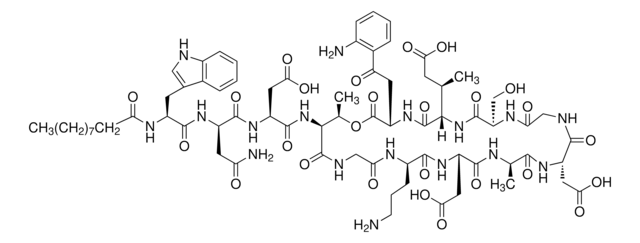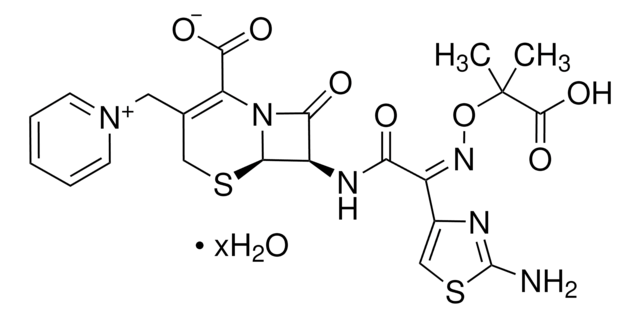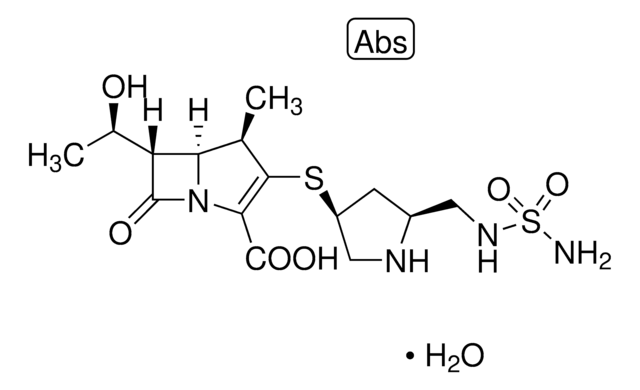PZ0021
Tigecycline hydrate
≥98% (HPLC)
Synonym(s):
9-t-Butylglycylamido-minocycline hydrate, TBG-MINO, Tigecyclin, Tygacil
About This Item
Recommended Products
Assay
≥98% (HPLC)
form
powder
optical activity
[α]/D -175 to -205°, c = 0.15 in methanol
color
off-white to yellow-brown
solubility
DMSO: ≥3 mg/mL (warmed)
storage temp.
2-8°C
SMILES string
O.CN(C)[C@H]1[C@@H]2C[C@@H]3Cc4c(cc(NC(=O)CNC(C)(C)C)c(O)c4C(=O)C3=C(O)[C@]2(O)C(=O)C(C(N)=O)=C1O)N(C)C
InChI
1S/C29H39N5O8.H2O/c1-28(2,3)31-11-17(35)32-15-10-16(33(4)5)13-8-12-9-14-21(34(6)7)24(38)20(27(30)41)26(40)29(14,42)25(39)18(12)23(37)19(13)22(15)36;/h10,12,14,21,31,36,38-39,42H,8-9,11H2,1-7H3,(H2,30,41)(H,32,35);1H2/t12-,14-,21-,29-;/m0./s1
InChI key
PMPLAEFBZIFHAR-KXLOKULZSA-N
General description
Application
- for antibiotic susceptibility testing
- to study its effects on multiple nonsmall cell lung cancer (NSCLC) cell lines
- to evaluate its effects on the binding of fluoroquinolones to human serum albumin
- as a standard to investigate the penetration of tigecycline into cornea, aqueous humor and vitreous humor
Biochem/physiol Actions
Other Notes
Signal Word
Danger
Hazard Statements
Precautionary Statements
Hazard Classifications
Aquatic Acute 1 - Aquatic Chronic 2 - Eye Dam. 1 - Repr. 1B - Skin Sens. 1
Storage Class Code
6.1C - Combustible acute toxic Cat.3 / toxic compounds or compounds which causing chronic effects
WGK
WGK 3
Flash Point(F)
Not applicable
Flash Point(C)
Not applicable
Certificates of Analysis (COA)
Search for Certificates of Analysis (COA) by entering the products Lot/Batch Number. Lot and Batch Numbers can be found on a product’s label following the words ‘Lot’ or ‘Batch’.
Already Own This Product?
Find documentation for the products that you have recently purchased in the Document Library.
Customers Also Viewed
Our team of scientists has experience in all areas of research including Life Science, Material Science, Chemical Synthesis, Chromatography, Analytical and many others.
Contact Technical Service
















